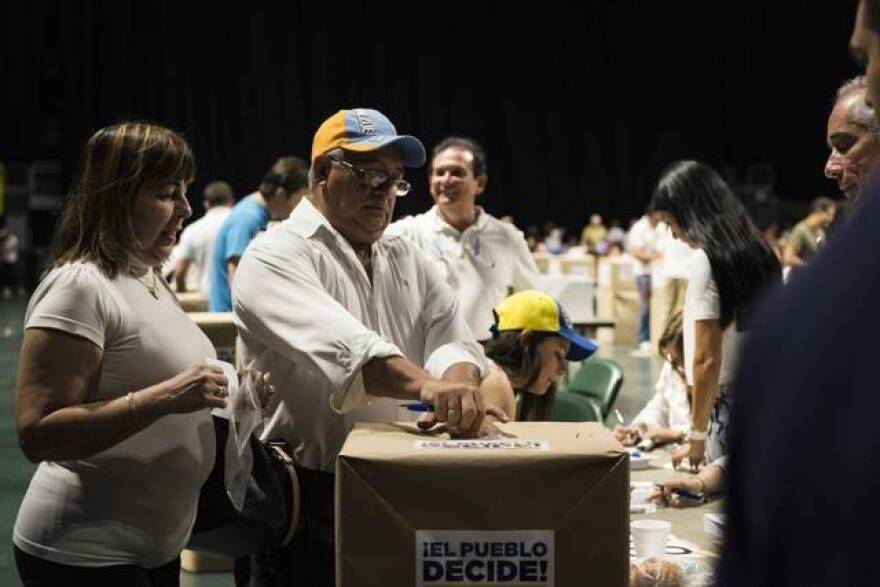COMMENTARY
Florida Senator Marco Rubio likes to tweet verses from the Book of Proverbs, an Old Testament favorite among conservatives that says, “Fear of the Lord is the beginning of wisdom.”
You could paraphrase that to describe the Republican Senator’s diplomatic philosophy: “Fear of America is the beginning of foreign policy.”
Rubio clings to the Cold War belief that the U.S. can and should make every geopolitical rogue from Cuba to North Korea cry uncle. So does President Trump.
So it was little surprise this week when Rubio tweeted a warning to Venezuelan President Nicolás Maduro: If Maduro goes through with his scheme to rewrite Venezuela’s constitution and set up a socialist dictatorship there – something Venezuelans resoundingly rejected in a symbolic referendum on Sunday – he can “expect a VERY strong response” from President Trump.
READ MORE: Sunday's Venezuela Vote Was Huge Symbolism. But Can It Prevent a Dictatorship?
It was even less surprising when Trump then issued a statement promising “strong and swift economic actions” against the Maduro regime if the constitutional rewrite starts as planned on July 30.
“The United States will not stand by as Venezuela crumbles” at the hands of “a bad leader who dreams of becoming a dictator,” Trump said, pointing to Venezuela’s catastrophic economic collapse.
The surest way to convince a bullying, left-wing, U.S.-insulting Latin American leader to do something you don’t want him to do is to have a bullying, right-wing, Latin America-insulting U.S. leader threaten to punish him if he does it. So Maduro and Trump are headed for a cross-Caribbean collision in less than two weeks.
A U.S. embargo on Venezuelan oil could bring the Maduro regime to its knees. Problem is, the very opposite could occur. Is that mentioned in the Book of Proverbs?
The only question left is: what “swift and strong” economic sanctions does Trump have in mind? He really has only two, unattractive choices.
One is to ratchet up what the U.S. has already been meting out, like targeted sanctions on Venezuelan officials responsible for the regime’s mushrooming human rights violations. But that could make Trump look weak: it hardly rises to the fire-and-brimstone justice he's vowed to rain down on Maduro.
The harsher measure would be an embargo on oil imports from Venezuela. But that could raise the economic pain for ordinary Venezuelans, who face demoralizing shortages of food, medicine and basic goods, from awful to horrific.
The reason: oil-rich Venezuela depends on crude sales for 96 percent of its export revenues, and the U.S. is its No. 1 customer. Venezuela, meanwhile, imports just about every other product it needs. Take away that U.S. share of oil-export cash and you’ve got a lot less currency for importing life’s necessities – especially when Maduro is already draining Venezuela’s meager foreign reserves to pay massive foreign debt obligations.
Still, the White House is considering the oil option – and even for some Venezuelans it’s an enticing notion if it means a quicker path to regime change.
TURNING SCREWS
“It would be very easy for us to do,” says Jorge Salazar-Carrillo, an economics professor at Florida International University in Miami and an expert on Venezuela’s oil industry.
That’s because, although Venezuela is the U.S.’s third largest foreign source of oil imports, it supplies less than a tenth of what Americans consume. Even that has been dropping this year, thanks to the increasingly dilapidated state of Venezuela’s state-run oil monopoly, Petróleos de Venezuela (PDVSA).
“And given today’s international oil glut, and with global prices so low,” Salazar-Carrillo told me, “it will be hard for Venezuela to find replacement markets to sell that oil if the U.S. stops buying it.”

At the same time, he points to an extra screw the U.S. could turn. Because Venezuelan oil is so heavy, it needs to be processed for refineries by mixing it with lighter crude – and a sizable portion of that supplemental oil now comes from the U.S, which Trump could also decide to withhold.
“If the U.S. approached this from both the importing and exporting sides,” says Salazar-Carrillo, “it could bring PDVSA, and the Maduro regime, to its knees.”
It could. Problem is, the very opposite could occur. Regimes like Maduro’s, from Cuba to North Korea, are famous for turning what they call “imperialist aggression” like this to their political benefit. It can actually help them stay on their feet – while it's their populations who remain on their knees.
That's wisdom the Book of Proverbs may not mention.





